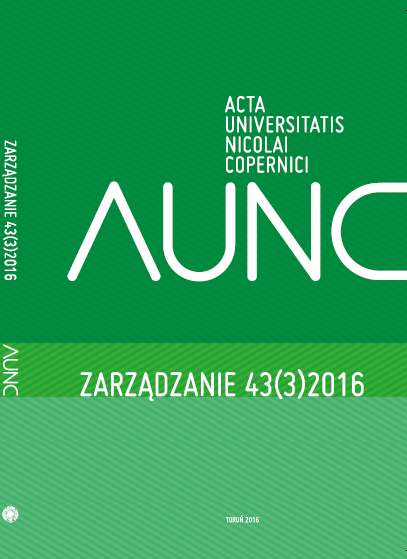INTERCULTURAL MANAGEMENT ON THE BASIS OF A SPORTS CLUB
DOI:
https://doi.org/10.12775/AUNC_ZARZ.2016.030Keywords
intercultural management, globalization, internationalization, culture, low-content culture, high-content culture, sport, communication, relationshipsAbstract
In the era of globalization, one increasingly finds oneself in a situation of having to work with representatives of various cultures. A person does not always have an impact on the choice of co-workers, but in order to arrange the relationship correctly it is necessary to know and respect cultural differences. In sport, the effect of globalization is very visible because the coverage of sport knows no bounds. In Poland, it manifests itself in a much greater amount and variety of foreigners employed in Polish clubs. Lack of awareness of cultural differences, insufficient preparation, general ignorance, and at the same time very often lack of humility, lead to the collapse of the communication within a sports organization and general difficulty in cooperation. This article presents dependencies that occur during the implementation of the tasks delegated by the coach among players coming from countries with high- context cultures and low-context cultures. This article presents the basic problems that affect Polish professional clubs. In addition, a detailed analysis of one of the Polish female basketball clubs will show changes in the international structure of employment in this club and what implications they had for its operation.
References
Bokszański Z., (2007), Indywidualizm a zmiana społeczna, Wydawnictwo Naukowe PWN, Warszawa.
Hall E., (2001), Poza kulturą, Wydawnictwo PWN, Warszawa.
Kamińska-Radomska I., (2012), Kultura biznesu, normy i formy, Wydawnictwo Naukowe PWN, Warszawa.
Kowalczyk S., (2010), Elementy filozofii i teologii sportu, Wydawnictwo Katolicki Uniwersytet Lubelski.
Mikuła B., (2015), Współczesne tendencje w zachowaniach organizacyjnych, Uniwersytet Ekonomiczny w Krakowie.
Panfil R., (2004), Zarządzanie produktem klubu sportowego, Wyższa Szkoła Edukacji w Sporcie, Warszawa.
Pawlak Z., Smoleń A., (2015), Strategie zawodowych klubów sportowych w Polsce, Oficyna Wydawnicza Szkoła Główna Handlowa w Warszawie.
Pedersen P., Thibault L., (2014), Contemporary Sport Management, 5th edition, Human Kinetics.
Stosik A., Morawski M., (2009), Zarządzanie kapitałem ludzkim dla menedżerów w sporcie, Akademia Wychowania Fizycznego we Wrocławiu.
Downloads
Published
How to Cite
Issue
Section
Stats
Number of views and downloads: 1579
Number of citations: 0







